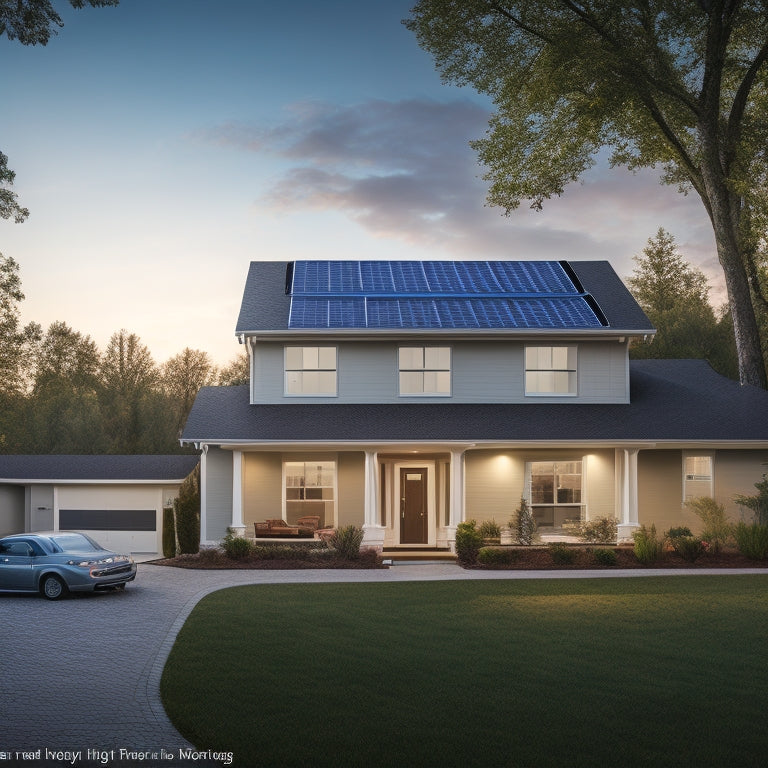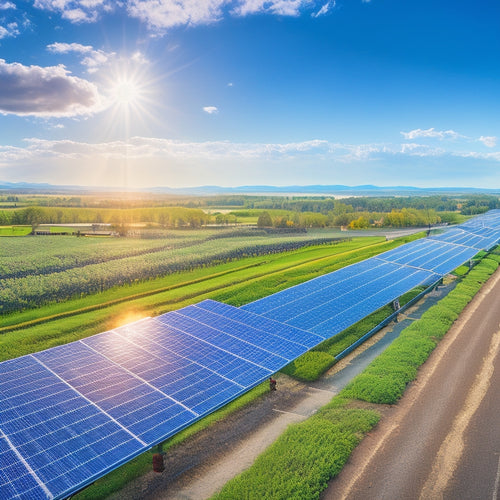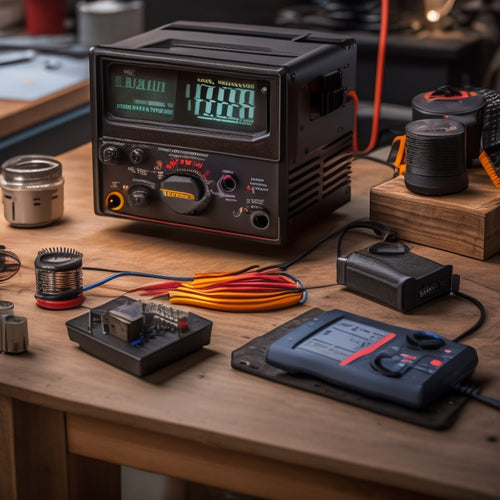
Cost of Solar With Battery Backup
Share
You're investing in a solar panel system with battery backup to guarantee reliable power during outages. The cost of this investment varies depending on your energy needs and system size. A typical solar panel system with battery backup can range from $15,000 to $30,000 or more. However, with incentives like tax credits and rebates, your upfront cost can be greatly reduced. Plus, you'll enjoy long-term savings on energy bills and increased property value. To get an accurate estimate, you'll need to assess your power needs and system requirements - and that's just the beginning of your expedition to energy independence.
The Essentials
- The cost of solar with battery backup varies, but installation costs average $15,000 to $30,000, depending on system size and battery type.
- Federal tax credits and state incentives can significantly reduce upfront costs, making solar with battery backup more affordable.
- Battery size and type impact overall cost, with deep cycle batteries offering longer lifetimes and higher efficiencies at a higher upfront cost.
- Long-term savings on energy bills and potential increase in property value can justify the initial investment in solar with battery backup.
- Financing options, such as loans and leasing, can make solar with battery backup more accessible to homeowners with varying budgets.
Reliable Power During Outages
When the grid goes down, you'll want a reliable source of power to keep your essential appliances running.
With a solar panel system paired with a battery backup, you can enjoy uninterrupted energy supply during blackouts. By storing excess energy generated during the day, you can tap into this reserve when you need it most, ensuring your safety and comfort.
This is particularly important for households with specific needs, such as those relying on medical equipment, as well as those seeking energy independence.
Power During Blackouts
Many homeowners experience at least one power outage per year, leaving them in the dark and disrupting their daily routines.
With solar energy and battery technology, you can take control of your energy needs and guarantee reliable power during blackouts. This blackout preparedness solution provides energy independence, allowing you to continue your daily activities without interruption.
By installing solar panels and a battery backup system, you'll have access to renewable resources even when the grid goes down. This means you can keep your lights on, your refrigerator running, and your communication devices charged.
You'll also enjoy cost savings by reducing your reliance on the grid and taking advantage of energy efficiency.
When planning for emergency situations, consider installation options that prioritize grid resilience.
With a solar-powered battery backup system, you'll be ready for any situation, from short-term outages to extended blackouts.
Energy Storage Benefits
The energy storage benefits of a solar-powered battery backup system lie in its ability to provide reliable power during outages. With a battery backup, you can enjoy energy independence, reducing your reliance on the grid and avoiding the financial burden of prolonged outages. This setup also enables cost savings through peak shaving, where you draw from your stored energy during periods of high demand, reducing your overall energy expenditure.
By utilizing the power of solar energy and storing it in a home solar power battery, you can guarantee a steady supply of electricity even when the grid is down. Additionally, solar-powered battery backup systems can be integrated with off-grid solar batteries to provide an all-encompassing energy solution.
Moreover, a solar-powered battery backup system has a positive environmental impact by optimizing grid efficiency and promoting renewable integration. By storing excess energy generated during the day, you can minimize waste and reduce your carbon footprint.
Advances in battery technology have made energy management more efficient, allowing you to monitor and control your energy usage with precision. Additionally, financial incentives, such as tax credits and rebates, can help offset installation costs, making this setup a more accessible option.
Increased Property Value Boost
You'll likely see a higher selling price for your property with a solar system and battery backup, as it's a highly desirable feature for many homebuyers.
In fact, residential solar panels are becoming increasingly popular among eco-conscious homeowners, driving up demand for sustainable properties.
This increase in property value can also lead to long-term appreciation, as your property becomes more attractive to potential buyers.
Higher Selling Price
Installing a solar power system with battery backup can greatly enhance your property's value, ultimately leading to a higher selling price. As a homeowner, you can expect a significant return on investment, with studies showing that solar-powered homes sell for up to 17% more than comparable non-solar homes.
This increased value can be attributed to the numerous benefits that come with solar energy, including lower maintenance expenses, increased system efficiency, and a reduced environmental impact. Additionally, financial incentives such as tax credits can offset the initial installation costs, making the investment even more attractive.
With technological advancements continually improving the efficiency and affordability of solar energy, it's no wonder that homeowners are seeking grid independence and energy independence.
Long-Term Appreciation
Beyond the initial enhancement in selling price, a solar power system with battery backup also yields long-term appreciation, as your property's worth continues to increase over time. This increase in value is driven by several factors, including financial incentives, investment returns, and utility savings.
As you enjoy energy independence, you'll also benefit from reduced maintenance costs and a minimized environmental impact. Moreover, technology advancements and tax credits contribute to the long-term appreciation of your property.
Market trends also play a role, as the demand for sustainable energy solutions continues to grow. Installation factors, such as the quality of the system and its integration with your property, also influence the level of appreciation.
As a result, your property's worth will increase over time, providing a significant return on investment. With a solar power system and battery backup, you're not only reducing your reliance on the grid but also securing an important asset that will appreciate in value over the long term.
Deep Cycle Battery Benefits
When you invest in deep cycle batteries for your solar power system, you'll reap two key benefits.
By incorporating renewable energy systems into your setup, you can maximize energy savings and stay powered during outages.
You'll extend the cycle life of your batteries, which means they'll last longer and require fewer replacements.
This, in turn, will improve power reliability, ensuring you have a consistent and steady supply of energy when you need it.
Extended Cycle Life
One key advantage of deep cycle batteries is their extended cycle life, which translates to a longer lifespan for your solar battery backup system.
This means you'll get more bang for your buck, as your batteries will last longer and require less frequent replacements.
When you opt for deep cycle batteries, you're investing in a system that's designed to handle the demands of daily charging and discharging.
This results in higher cycle efficiency, allowing your batteries to perform at their best even after hundreds of charge cycles.
With proper battery maintenance, such as regular checks and balancing, you can further extend the lifespan of your batteries.
Improved Power Reliability
Your deep cycle batteries provide improved power reliability, ensuring that your solar battery backup system delivers consistent performance even during extended periods of grid outage or heavy loads. This means you can enjoy uninterrupted energy independence, without worrying about sudden blackouts or power fluctuations.
With solar technology, you're no longer reliant on the grid, and your system's efficiency remains unaffected by external factors. The installation costs of a solar battery backup system may seem steep, but the long-term benefits and government incentives make it a worthwhile investment.
Additionally, the environmental impact of switching to renewable energy is significant, and with proper maintenance requirements, your system will continue to perform effectively. As consumer awareness about the importance of grid integration grows, you can rest assured that your system is designed to seamlessly interact with the grid, providing a reliable source of power.
With various financing options available, achieving energy independence has never been more accessible.
Wattage Capacity Considerations Matter
When sizing a battery backup system, you need to evaluate the wattage capacity required to meet your backup power needs.
It's crucial to verify you have a reliable energy storage solution, like a home energy storage system, to power your home smoothly during outages.
The battery size matters, as it directly affects the duration of backup power you'll have during an outage.
To accurately determine the necessary wattage capacity, you'll need to calculate your total backup power load and the desired backup time.
Battery Size Matters
Selecting a battery with the right wattage capacity is critical to guaranteeing your solar power system can provide reliable backup during outages.
You'll want a battery that can handle the maximum power output of your solar panels while considering your energy needs during an outage. A larger battery may provide more backup power, but it also increases installation costs and maintenance requirements. Conversely, a smaller battery may be more affordable but may not provide sufficient backup power.
When choosing a battery, consider its efficiency, solar compatibility, and inverter type. Look for high-efficiency batteries that minimize energy loss during charging cycles. Confirm the battery is compatible with your solar panel system and inverter type to optimize system integration.
Additionally, consider the environmental impact of the battery and its manufacturer. You'll also want to evaluate the battery's performance metrics, such as its depth of discharge and round-trip efficiency, to determine its overall value.
Backup Power Needs
Crucial loads, such as refrigerators and medical equipment, require a specific amount of power to function during an outage, making accurate calculation of your backup power needs imperative.
You'll need to determine the total wattage of the devices you want to power during an outage. This will help you choose the right battery types and system size.
To calculate your backup power needs, make a list of the essential appliances you want to power. Then, check the wattage rating of each device, usually found on the manufacturer's label or website.
Add up the total wattage to determine the minimum capacity required. Don't forget to take into account the startup surge required by some appliances, like refrigerators or pumps.
Accurate calculations will help you avoid oversizing or undersizing your system, which can impact installation costs and overall performance.
Longer Lifespan Guaranteed
You'll appreciate that a solar system with battery backup can provide extended power outage protection, ensuring your home remains energized even during prolonged grid failures.
This means you'll have a reliable source of power when you need it most, without worrying about food spoilage or disrupted daily routines.
Extended Power Outage Protection
With most grid-tied solar systems, a prolonged power outage can render your solar panels useless, leaving you in the dark. This is because they're designed to shut down during outages to prevent backfeeding energy into the grid.
However, with a solar energy system featuring battery backup, you can enjoy extended power outage protection.
You'll have the freedom to power your essential appliances and lights during extended outages, providing you with a sense of security and independence. This is made possible by advanced battery management strategies that guarantee your batteries are always ready to provide backup power when needed.
When the grid goes down, your solar energy system will seamlessly shift to battery backup mode, providing you with a reliable source of power.
This means you can keep your refrigerator running, your lights on, and your communication devices charged, even when the grid is down.
Frequently Asked Questions
Can I Use My Existing Solar Panels With a New Battery Backup System?
You can potentially reuse your existing solar panels with a new battery backup system, but you'll need to verify solar panel compatibility and investigate battery integration options to guarantee seamless energy harvesting and storage.
How Long Does It Take to Install a Solar With Battery Backup System?
Like a skilled builder, you're planning your energy independence. Now, you're wondering how long it takes to install a solar with battery backup system. Typically, it takes 2-5 days, depending on system components and complexity, to complete the installation timeline.
Are There Any Government Incentives for Solar With Battery Backup Systems?
You'll be glad to know that yes, there are government incentives for solar with battery backup systems. You can claim federal incentives like the Solar Investment Tax Credit (ITC) and investigate state rebates, which vary by location, to offset your system's cost.
Can I Charge My Electric Car With a Solar With Battery Backup System?
You can charge your electric car with a solar with battery backup system, leveraging charging options like Level 2 charging or DC Fast Charging, depending on your battery capacity and the system's power output.
Do Solar With Battery Backup Systems Require Regular Maintenance?
Ah, freedom from utility bills, but not from maintenance! You'll need to perform routine checks to guarantee your battery backup system runs smoothly, as infrequent maintenance can lead to reduced battery lifespan and decreased overall performance.
Final Thoughts
As you weigh the cost of solar with battery backup, remember that it's like having a reliable ace up your sleeve. When the grid goes down, your system kicks in, providing seamless power. In fact, a study by the National Renewable Energy Laboratory found that solar-powered homes with battery backup sell for up to 17% more than those without. Invest in a reliable energy future - it's a move that will pay dividends for years to come.
Related Posts
-

Why Outdoor Solar Lighting Systems Are Sustainable
Outdoor solar lighting systems are sustainable because they utilize renewable energy, drastically reducing your carbo...
-

Applications of Photovoltaic Systems
Photovoltaic systems are versatile, converting sunlight into electricity for various applications. You can use them i...
-

Key Features of a DC to AC Converter
A DC to AC converter features high efficiency and conversion rates, which reduce energy costs and improve performance...


